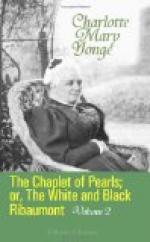Berenger gladly accepted the proposal. It did not occur to him that he was thus involved in the civil war, and bearing arms against the sovereign. In spite of Queen Elisabeth’s alliance with the French court, she connived at her youthful subjects seeking the bubble reputation in the mouths of Valois cannon; and so little did Henry III. seem to Berenger to be his king, that he never thought of the question of allegiance,—nay, if the royal officers were truly concerned in his arrest, he was already an outlaw. This was no moment for decision between Catholic and Calvinist; all he wanted was to recover his wife and forestall her enemies.
Henry of Navarre gave his full consent to the detachment being placed under charge of M. de Ribaumont. He asked somewhat significantly what had become of the young gentleman who had attended M. de Ribaumont, and Philip blushed crimson to the ears, while Berenger replied, with greater coolness than he had given himself credit for, that the youth had been nearly drowned on the Sable d’Olonne, and had been left at Dom Colombeau’s to recover. The sharp-witted King looked for a moment rather as Sir Hugh the Heron did when Marmion accounted for his page’s absence, but was far too courteous and too INSOUCIANT to press the matter further, though Berenger saw quite enough of is expression to feel that he had been delivered from his companion only just in time.
Berenger set forth as soon as his impatience could prevail to get the men into their saddles. He would fain have ridden day and night, and grudged every halt for refreshment, so as almost to run the risk of making the men mutinous. Evening was coming on, and his troop had dismounted at a cabaret, in front of which he paced up and down with Philip, trying to devise some pretext for hastening them on another stage before night, when a weary, travel-stained trooper rode up to the door and was at once hailed as a comrade by the other men, and asked, ’What cheer at Pont de Dronne?’
‘Bad enough,’ he answered, ’unless you can make the more speed there!’ then making obeisance to Berenger he continued his report, saying that Captain Falconnet was sending him to M. le Duc with information that the Guisards were astir, and that five hundred gens d’armes, under the black Nid de Merle, as it was said, were on their way intending to surprise Pont de Dronne, and thus cut the King of Navarre off from Guyenne and his kingdom beyond it. After this Berenger had no more difficulty with his men, who were most of them Quinet vassals, with homes south of the Dronne, and the messenger only halted for a hasty meal, hastening on to the Duke, that a more considerable succour might at once be dispatched.




